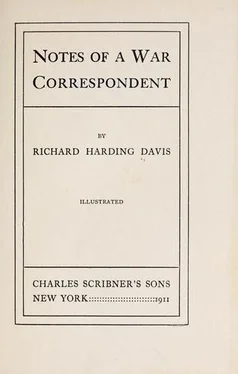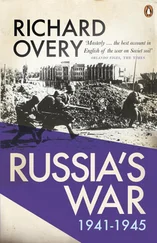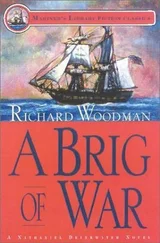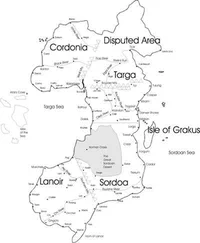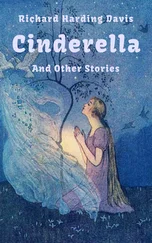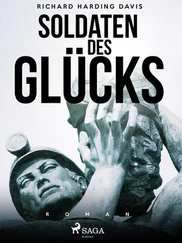Richard Davis - Notes of a War Correspondent
Здесь есть возможность читать онлайн «Richard Davis - Notes of a War Correspondent» весь текст электронной книги совершенно бесплатно (целиком полную версию без сокращений). В некоторых случаях можно слушать аудио, скачать через торрент в формате fb2 и присутствует краткое содержание. Город: New York, Год выпуска: 1911, Издательство: Charles Scribner’s Sons, Жанр: Публицистика, prose_military, на английском языке. Описание произведения, (предисловие) а так же отзывы посетителей доступны на портале библиотеки ЛибКат.
- Название:Notes of a War Correspondent
- Автор:
- Издательство:Charles Scribner’s Sons
- Жанр:
- Год:1911
- Город:New York
- ISBN:нет данных
- Рейтинг книги:5 / 5. Голосов: 1
-
Избранное:Добавить в избранное
- Отзывы:
-
Ваша оценка:
- 100
- 1
- 2
- 3
- 4
- 5
Notes of a War Correspondent: краткое содержание, описание и аннотация
Предлагаем к чтению аннотацию, описание, краткое содержание или предисловие (зависит от того, что написал сам автор книги «Notes of a War Correspondent»). Если вы не нашли необходимую информацию о книге — напишите в комментариях, мы постараемся отыскать её.
Summary by Neeru Iyer
Notes of a War Correspondent — читать онлайн бесплатно полную книгу (весь текст) целиком
Ниже представлен текст книги, разбитый по страницам. Система сохранения места последней прочитанной страницы, позволяет с удобством читать онлайн бесплатно книгу «Notes of a War Correspondent», без необходимости каждый раз заново искать на чём Вы остановились. Поставьте закладку, и сможете в любой момент перейти на страницу, на которой закончили чтение.
Интервал:
Закладка:
The enemy’s fire was exceedingly heavy, and his aim was excellent. We saw nothing of the Spaniards, except a few on the ridge across the valley. I happened to be the only one present with field glasses, and when I discovered this force on the ridge, and had made sure, by the cockades in their sombreros, that they were Spaniards and not Cubans, I showed them to Roosevelt. He calculated they were five hundred yards from us, and ordered the men to fire on them at that range. Through the two hours of fighting that followed, although men were falling all around us, the Spaniards on the ridge were the only ones that many of us saw. But the fire against us was not more than eighty yards away, and so hot that our men could only lie flat in the grass and return it in that position. It was at this moment that our men believed they were being attacked by Capron’s troop, which they imagined must have swung to the right, and having lost its bearings and hearing them advancing through the underbrush, had mistaken them for the enemy. They accordingly ceased firing and began shouting in order to warn Capron that he was shooting at his friends. This is the foundation for the statement that the Rough Riders had fired on each other, which they did not do then or at any other time. Later we examined the relative position of the trail which Capron held, and the position of G Troop, and they were at right angles to one another.
Capron could not possibly have fired into us at any time, unless he had turned directly around in his tracks and aimed up the very trail he had just descended. Advancing, he could no more have hit us than he could have seen us out of the back of his head. When we found many hundred spent cartridges of the Spaniards a hundred yards in front of G Troop’s position, the question as to who had fired on us was answered.
It was an exceedingly hot corner. The whole troop was gathered in the little open place blocked by the network of grape-vines and tangled bushes before it. They could not see twenty feet on three sides of them, but on the right hand lay the valley, and across it came the sound of Young’s brigade, who were apparently heavily engaged. The enemy’s fire was so close that the men could not hear the word of command, and Captain Llewellyn and Lieutenant Greenway, unable to get their attention, ran among them, batting them with their sombreros to make them cease firing. Lieutenant-Colonel Roosevelt ran up just then, bringing with him Lieutenant Woodbury Kane and ten troopers from K Troop. Roosevelt lay down in the grass beside Llewellyn and consulted with him eagerly. Kane was smiling with the charming content of a perfectly happy man. When Captain Llewellyn told him his men were not needed, and to rejoin his troop, he led his detail over the edge of the hill on which we lay. As he disappeared below the crest he did not stoop to avoid the bullets, but walked erect, still smiling. Roosevelt pointed out that it was impossible to advance farther on account of the network of wild grape-vines that masked the Spaniards from us, and that we must cross the trail and make to the left. The shouts the men had raised to warn Capron had established our position to the enemy, and the firing was now fearfully accurate. Sergeant Russell, who in his day had been a colonel on a governor’s staff, was killed, and the other sergeant was shot through the wrist. In the space of three minutes nine men were lying on their backs helpless. Before we got away, every third man was killed, or wounded. We drew off slowly to the left, dragging the wounded with us. Owing to the low aim of the enemy, we were forced to move on our knees and crawl. Even then men were hit. One man near me was shot through the head. Returning later to locate the body and identify him, I found that the buzzards had torn off his lips and his eyes. This mutilation by these hideous birds was, without doubt, what Admiral Sampson mistook for the work of the Spaniards, when the bodies of the marines at Guantanamo were found disfigured. K Troop meantime had deployed into the valley under the fire from the enemy on the ridge. It had been ordered to establish communication with General Young’s column, and while advancing and firing on the ridge, Captain Jenkins sent the guidon bearer back to climb the hill and wave his red and white banner where Young’s men could see it. The guidon bearer had once run for Congress on the gold ticket in Arizona, and, as some one said, was naturally the man who should have been selected for a forlorn hope. His flag brought him instantly under a heavy fire, but he continued waving it until the Tenth Cavalry on the other side of the valley answered, and the two columns were connected by a skirmish-line composed of K Troop and A, under Captain “Bucky” O’Neill.
G Troop meanwhile had hurried over to the left, and passing through the opening in the wire fence had spread out into open order. It followed down after Captain Luna’s troop and D and E Troops, which were well already in advance. Roosevelt ran forward and took command of the extreme left of this line. Wood was walking up and down along it, leading his horse, which he thought might be of use in case he had to move quickly to alter his original formation. His plan, at present, was to spread out his men so that they would join Young on the right, and on the left swing around until they flanked the enemy. K and A Troops had already succeeded in joining hands with Young’s column across the valley, and as they were capable of taking care of themselves, Wood was bending his efforts to keep his remaining four companies in a straight line and revolving them around the enemy’s “end.” It was in no way an easy thing to do. The men were at times wholly hidden from each other, and from him; probably at no one time did he see more than two of his troops together. It was only by the firing that he could tell where his men lay, and that they were always advancing.
The advances were made in quick, desperate rushes—sometimes the ground gained was no more than a man covers in sliding for a base. At other times half a troop would rise and race forward and then burrow deep in the hot grass and fire. On this side of the line there was an occasional glimpse of the enemy. But for a great part of the time the men shot at the places from where the enemy’s fire seemed to come, aiming low and answering in steady volleys. The fire discipline was excellent. The prophets of evil of the Tampa Bay Hotel had foretold that the cowboys would shoot as they chose, and, in the field, would act independently of their officers. As it turned out, the cowboys were the very men who waited most patiently for the officers to give the word of command. At all times the movement was without rest, breathless and fierce, like a cane-rush, or a street fight. After the first three minutes every man had stripped as though for a wrestling match, throwing off all his impedimenta but his cartridge-belt and canteen. Even then the sun handicapped their strength cruelly. The enemy was hidden in the shade of the jungle, while they, for every thicket they gained, had to fight in the open, crawling through grass which was as hot as a steam bath, and with their flesh and clothing torn by thorns and the sword-like blade of the Spanish “bayonet.” The glare of the sun was full in their eyes and as fierce as a lime-light.
When G Troop passed on across the trail to the left I stopped at the place where the column had first halted—it had been converted into a dressing station and the wounded of G Troop were left there in the care of the hospital stewards. A tall, gaunt young man with a cross on his arm was just coming back up the trail. His head was bent, and by some surgeon’s trick he was carrying a wounded man much heavier than himself across his shoulders. As I stepped out of the trail he raised his head, and smiled and nodded, and left me wondering where I had seen him before, smiling in the same cheery, confident way and moving in that same position. I knew it could not have been under the same conditions, and yet he was certainly associated with another time of excitement and rush and heat. Then I remembered him. As now he had been covered with blood and dirt and perspiration, but then he wore a canvas jacket and the man he carried on his shoulders was trying to hold him back from a white-washed line. And I recognized the young doctor, with the blood bathing his breeches, as “Bob” Church, of Princeton. That was only one of four badly wounded men he carried that day on his shoulders over a half-mile of trail that stretched from the firing-line back to the dressing station and under an unceasing fire. [3] For this “distinguished gallantry in action,” James R. Church later received the medal of honor.
As the senior surgeon was absent he had chief responsibility that day for all the wounded, and that so few of them died is greatly due to this young man who went down into the firing-line and pulled them from it, and bore them out of danger. The comic paragraphers who wrote of the members of the Knickerbocker Club and the college swells of the Rough Riders and of their imaginary valets and golf clubs, should, in decency, since the fight at Guasimas apologize. For the same spirit that once sent these men down a white-washed field against their opponents’ rush line was the spirit that sent Church, Channing, Devereux, Ronalds, Wrenn, Cash, Bull, Lamed, Goodrich, Greenway, Dudley Dean, and a dozen others through the high hot grass at Guasimas, not shouting, as their friends the cowboys did, but each with his mouth tightly shut, with his eyes on the ball, and moving in obedience to the captain’s signals.
Интервал:
Закладка:
Похожие книги на «Notes of a War Correspondent»
Представляем Вашему вниманию похожие книги на «Notes of a War Correspondent» списком для выбора. Мы отобрали схожую по названию и смыслу литературу в надежде предоставить читателям больше вариантов отыскать новые, интересные, ещё непрочитанные произведения.
Обсуждение, отзывы о книге «Notes of a War Correspondent» и просто собственные мнения читателей. Оставьте ваши комментарии, напишите, что Вы думаете о произведении, его смысле или главных героях. Укажите что конкретно понравилось, а что нет, и почему Вы так считаете.
